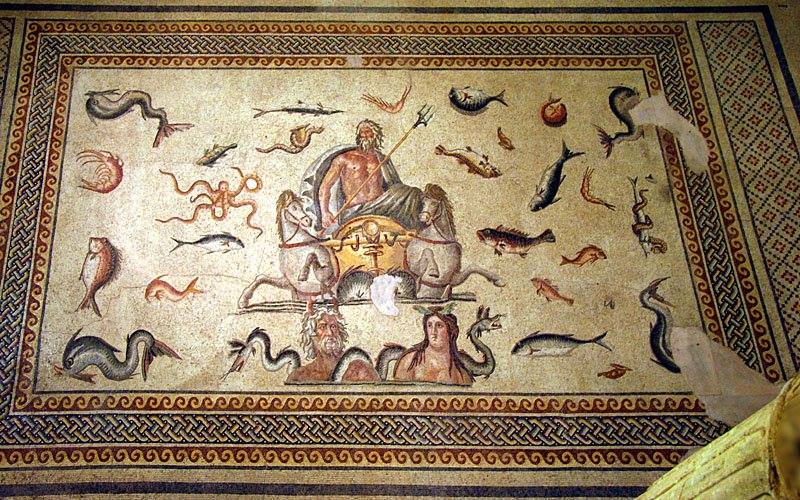We were talking about Pallas (as in Pallas Athena) the other day, and it seems the mythological roots for that name are (mirabile dictu!) more complex than we thought. There was a Pallas who was a Libyan nymph and childhood friend of Athena, according to certain traditions:
"They say that after Athene's birth, she was reared by Triton, who had a daughter named Pallas. Both girls cultivated the military life, which once led them into contentious dispute. As Pallas was about to give Athene a whack, Zeus skittishly held out the aegis, so that she glanced up to protect herself, and thus was wounded by Athene and fell. Extremely saddened by what had happened to Pallas, Athene fashioned a wooden likeness of her, and round its breast tied the aegis which had frightened her, and set the statue beside Zeus and paid it honour." [Pallas the Nymph]In Book 7, the Pallas whose two sons arrive with Cephalus is a brother of King Aegeus. This Pallas had 50 sons, all later killed by Theseus. But there's another Pallas, the Titan of warcraft, also relevant to Athena:
PALLAS was the Titan god (perhaps) of warcraft and the Greek campaign season of late spring and early summer. He was the father of Victory, Rivalry, Strength and Power by Styx (Hate), children who turned to the side of Zeus during the Titan-War. Pallas' name was derived from the Greek word pallô meaning "to brandish (a spear)."He was a second generation Titan, a son of Krios and Eurybia, whose other sons were Astraeus and Perses. His wife was Styx. In some stories, Athena conquered Pallas in the Titanomachy;
Pallas was clearly imagined as a goat-like god. In the story of the Titan-War, Athene vanquished him in battle, and crafted her stormy aigis (goat-skin) shield from his skin.A variant says Pallas was Athena's father, and she killed him when he tried to assault her.
Pallas's children by Styx are all about power: Nike (Victory), Kratos (Strength), Zelos (Rivalry) and Bia (Force).
Pallas's siblings, Perses and Astraeus, also had significant children: Perses, god of destruction, had one child with Asteria: Hekate, whom we last saw with Medea in Book 6. (Note: Perses must not be confused with Perseis, daughter of Okeanos and, with Helios, mother of Aeetes, Circe, and Pasiphae.)
His other brother, Astraeus (or Astraios), god of stars and planets, fathered the Anemoi (Winds: Boreas, Zephyros, Notos, Euros) and Eosphoros. His consort and their mother was Eos, the Dawn.
 |
| Eosophoros leads Eos and Helios |
So the Titan Pallas (along with siblings Perse and Astraeus) belongs to a generation before the Olympians -- a generation of might and violence, from which came a host of disruptive, large-scale entities: winds, stars and planets, dawn, force, strength, and Hekate. "Disruptive" because the Titans and these children (with the possible exception of the stars) neither respect borders or orders. They are in motion, they embody aspects of power, and are found on both sides of thresholds. For example, note how Eos is in the middle of the image above -- a creature of both night and day. And Hekate -- unlike the Olympians who can be said to have a certain fixed place and role in the cosmos (with the possible exceptions of Dionysus and Hermes) -- has triple rights and powers, in the underworld, on Earth, and above.
All this relates to a theme that runs throughout the Metamorphoses: that the Olympian preeminence in the world was both hard-won, and can never be said to be final. Surrounding the serenity of Olympus are the submerged powers of the Titanic forebears, who are straining to unleash force -- volcanic eruptions -- as well as monsters -- into the world.
When Ovid introduces Theseus in Book 7, he is the Athenian hero par excellence in part because he clears the central artery between Corinth and Athens of a host of simply abhorrent monsters. I think Ovid is reminding us that the Athenian preeminence, like that of the Olympians that they revered on a parallel plane, was hard-won, ever-precarious, and essentially contested.

No comments:
Post a Comment